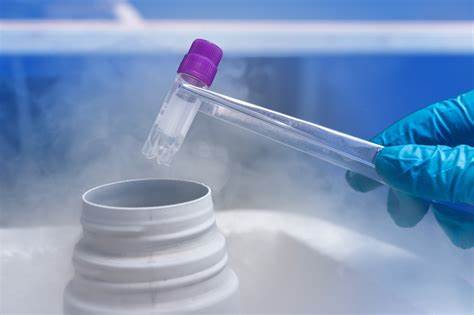As we progress in age, our bodies start to change. These changes that occur as a part of ageing may make it difficult for women to achieve and sustain a pregnancy. On the other hand, a woman of reproductive age could be dealing with health complications or other issues that may push the dream of motherhood further away. Either way, there are options that can help you with this, one of them being embryo cryopreservation.
What is Embryo Cryopreservation?
While this may not count as an infertility treatment by itself, it is certainly a solution that aids several fertility treatments in various scenarios. Cryopreservation for infertility, or embryo cryopreservation is a process where a woman’s eggs (unfertilised) are retrieved, fertilised in vitro, and frozen for use in the future. Thus, the process is also known as cryopreservation.
The history of embryo cryopreservation dates back to the 1950s and has since been a significant part of assisted reproductive technology. Presently, cycles of treatments such as IVF may result in multiple successful fertilised eggs. After a successful cycle, a couple may choose to freeze the rest for future use. However, a couple may also choose to achieve embryos through IVF and save them for later use.
Who Should Consider Embryo Cryopreservation?
There are a host of reasons – health and otherwise – for which a woman may opt for embryo cryopreservation. If you are considering freezing your eggs, here are some of the most common reasons that leads one to freeze their eggs through cryopreservation.
- Cancer that requires the person to undergo radiation therapy or chemotherapy. This may alter their reproductive health and fertility.
- Genetic history of ovarian failures or reproductive issues.
- The onset of ovarian diseases and/or imminent treatment for the same.
- Impending surgery or invasive treatments that may alter the reproductive health or the condition of the ovaries.
- Studies, employment, or other such personal commitments.
Do you identify with any of the above reasons? Either way, it would be ideal to seek consultation with your doctor. Remember that every case is unique. Speaking with your doctor will help you gain clarity about whether this is the right way for you.
Embryo Cryopreservation: Facts and Risks
Here are a few things you should keep in mind when considering freezing your eggs.
- Usually, embryos are frozen one to six days after they are created.
- Once frozen, they can be left that way for years. However, there is not ample data availability regarding the maximum duration of cryopreservation.
- Some countries have rules specifying the maximum duration of keeping your eggs frozen. Stay informed about this if you are seeking treatment in another country.
- Egg freezing does not generally affect the health of the foetus. These children have the same risk of birth defects and health concerns as children of natural pregnancies.
- The success rate of a pregnancy through cryopreservation and live birth also depends on the age and health of the woman carrying the resultant pregnancy.
- Cryopreservation does not change the additional risks that may come with pregnancy at an advanced age.
Cryopreservation has helped achieve several pregnancies around the world since it was first attempted. If you think it is the way ahead for you, speak with a specialist and know how it should help you achieve parenthood.

